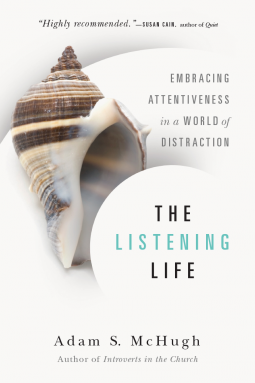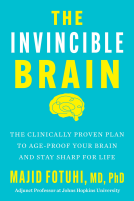
The Listening Life
Embracing Attentiveness in a World of Distraction
by Adam S. McHugh
This title was previously available on NetGalley and is now archived.
Send NetGalley books directly to your Kindle or Kindle app
1
To read on a Kindle or Kindle app, please add kindle@netgalley.com as an approved email address to receive files in your Amazon account. Click here for step-by-step instructions.
2
Also find your Kindle email address within your Amazon account, and enter it here.
Pub Date Dec 09 2015 | Archive Date Mar 31 2016
InterVarsity Press | IVP Books
Description
How would our lives change if we approached every experience with the intention of listening first?
In this noisy, distracting world, it is difficult to truly hear. People talk past each other, eager to be heard but somehow deaf to what is being said. Listening is an essential skill for healthy relationships, both with God and with other people. But it is more than that: listening is a way of life.
Adam McHugh places listening at the heart of our spirituality, our relationships and our mission in the world. God himself is the God who hears, and we too can learn to hear what God may be saying through creation, through Scripture, through people. By cultivating a posture of listening, we become more attentive and engaged with those around us. Listening shapes us and equips us to be more attuned to people in pain and more able to minister to those in distress.
Our lives are qualitatively different—indeed, better—when we become listeners. Heed the call to the listening life, and hear what God is doing in you and the world.
Advance Praise
—Ruth Haley Barton, founder and president, Transforming Center, author of Life Together in Christ
"Adam McHugh has been a significant contributor to the conversation about how introverts experience the world. His new book, The Listening Life, has the power to reshape how both introverts and extroverts make space for deep listening in a world that swims in the shallows. Highly recommended."
—Susan Cain, cofounder of Quiet Revolution, author of Quiet
"Adam McHugh is a voice worth listening to. His new book will be a gift to anyone who wants to cultivate what Jesus called 'ears to hear.'"
—John Ortberg, senior pastor of Menlo Park Presbyterian Church
Available Editions
| EDITION | Paperback |
| ISBN | 9780830879694 |
| PRICE | $12.99 (USD) |
Links
Average rating from 8 members
Featured Reviews
 Deborah W, Reviewer
Deborah W, Reviewer
"The Listening Life" is about truly listening to God and to others and how this can transform our relationships. The author started off by describing why good listening is important. He looked at Scripture to see how people listened to God and how God listens to His people. This section reminded me why I love my God so much: our God listens!
He talked about listening directly to God and to God through Scripture, creation, and other people. He described bad and good ways of listening to others. Not rules but more starting with a right attitude. He also discussed listening to yourself (in a biblical way) and suggested how different church would be if people knew they would be heard, not preached at.
The book had a casual tone with a cadence that was pleasant to read. He looked at Scripture, but he also suggested ancient Christian practices and things he's found to help as he's learned to be a better listener. I'd recommend this book to those who want to build closer relationships with God and people.
 Rosa S, Educator
Rosa S, Educator
A challenge. A feast of poetic prose. An opportunity to reflect on God's voice. Worth your time and focus.
 Linda J, Reviewer
Linda J, Reviewer
This is an excellent book. The author speaks of how God listens, how we can listen to God, to ourselves and how to others.
 Conrade Y, Reviewer
Conrade Y, Reviewer
Attentiveness is a much needed quality these days. In a culture where distracted driving is occurring more often than drunk driving, people tend to be talking more and listening less. Welcome to an age of distraction and self-seeking endeavors. According to Adam McHugh, "listening comes first" even before we were born. McHugh, an ordained minister with the Presbyterian Church USA is also spiritual director, speaker, and retreat leader. His first book, "Introverts in the Church" talks about the plight of introverts trying to find their place in churches that tend to appeal more to extroverts. This second book of his attempts to contrast the need for listening in a highly talkative world. Why listen? That is because listening is the foundational discipline for what it means to be human. It is the first step of discipleship. It helps us avoid grabbing too much sound space from others. It prepares us with a disposition to receive instructions from God rather than to tell God what God already knew. For preachers, listening comes before preaching. In this very perceptive book, McHugh provides some challenging questions:
If we learn to listen first, how will that impact our relationships?
If we discipline ourselves to listen to God first, how will our relationship with God become?
What if our default position in anything is listening?
What will happen if we learn to listen first with our ears rather than to move our lips?
What about listening to our inner selves?
This book prepares us to answer all of the above, and more. The first two chapters of the book set the stage for McHugh's main thesis, that listening is the first step in any relationship. He explains the origins of listening and its relationship to obedience. In Latin, the word 'obey' cannot exist apart from 'listen.' In Greek and Hebrew, the biblical words for listening can be translated as obeying. Not only is listening the first step in discipleship, listening is fodder for discipleship and servanthood. While this is a simple idea, the complications come when we become immersed in an environment of noise and distractions. There is the distraction of noise. From thousands of advertisements thrown at us each day to busy activities on social media, listening to the things that matter most becomes a challenge in itself. There is the distraction of loneliness where we become so self-centered that we fail to listen to others. There is the refusal to change in which we close ourselves from learning. There is the fragmentation of the self which leads to a division of what we do and who we really are. McHugh makes several observations of how technology has impacted us. We get a deluge of information coming at us pulling us away from actually listening to what we need. People wear headphones or earbuds to shut the world out. Music becomes the background to what we do instead of cultivating our appreciation for what music is representing.
McHugh goes through some historical examples of how kings and leaders who listened actually prospered and fared better than those who didn't. Napoleon ignored advice and was exiled. King George III refused to listen to the growing unrest due to his taxation policies and caused a war. We learn that people in positions of power tend to be poor listeners. Good leaders listen. Great leaders listen well. The spiritual leader prays and listens attentively. Readers are then treated to six types of listening.
First, we listen to God. Just like Elijah who knows God and senses His presence, we too can cultivate divine listening via Scripture meditation; community; and reflection. We recognize the presence of God. We seek after God. We move closer to God and we celebrate each time we meet with God. Prayer is listening. Everyday living involves listening.
Second, we listen with Scripture as our Guide. The Bible is full of references to the primacy of listening. As the Word of God dwells in us, we are changed from the inside out. We learn more about our true selves. Most importantly, we encounter God. A good spiritual practice would be to pray the Scriptures. The second century monk, Guigo the Second teaches the four steps of sacred reading: 1) lectio (reading); 2) meditatio (meditation); 3) oratio (prayer); 4) contemplatio (contemplation).
Third, we listen to creation. Taking the examples of St Francis of Assisi who talks to both plants and animals as well as John Muir who feels one with nature, McHugh carefully tells us not to be stuck in the things of creation per se, but to let creation lead us to the praise of God. Lest we fall into pantheism (everything is god) or panentheism (god is in everything).
Four, we listen to others. We can learn by spending time with people who listen well. People with a heart of a listener who are motivated by love for people. What I find useful is how we can identity and avoid bad listening. We are poor listeners when we listen in order to reply. We listen more to compete and compare rather than to show compassion and understanding. We are poor listeners when we listen in order to judge or use questions to manipulate another person. We can distract others by interrogation; by projecting our thoughts on others; by re-routing the conversation; by focusing on the small things and ignoring the larger picture; by hijacking a conversation with our own preferences; and many more. The key to good listening is this: It's not about you. McHugh highlights some practices of good listening such as being quick to listen and slow to speak; using open questions; reflecting back what we have heard; help the other person expand the conversation; and actively listen by showing our engagement and posture.
The fifth area is particularly important if we want to minister with compassion and love. It is about listening to people who are in pain. We must be careful not to shoot them down with careless words. Even the use of the Bible can become a way to close the conversation when we throw Scripture at them in an unloving way. People who are hurting often do not need advice. They just need an understanding heart and someone who cares enough to wait and to listen to them. Caregivers and friends need to cultivate non-anxious disposition when interacting with people in pain. We empathize with them. We weep together. We become agents of healing for them when truth and love embrace together as one.
Six, we learn to listen to ourselves. McHugh shows us the importance of discernment which is about paying attention to the "interior movements of the soul." Whether it is emotion, intellect, impulses, ideas, or whatever stirrings inside us, when we can identify them and bring them to God, we discern with God as our guide. There is an important point about the purpose of discernment. Not self-discovery but love. The art of prioritizing being over doing is essentially about entering into love that we may live our lives in love to God, to neighbour, and to self. A useful part of the book involves the discerning of good from bad voices. Such bad voices come across in the form of rude parenting; therapist behavior; defensive thinking; critical voices; legalistic arguments; doomsday predictors; bullies; and so on. There is a list of very good questions that can help the individual ask good questions in order to listen to ourselves better. These alone are worth the price of this book.
So What?
Let me offer three thoughts about this book. First, there is always room for one more book about listening well. I feel that we are deluged with all kinds of information nowadays but not many people know how to handle them. There are many self-help books to help us speak better, do more, manage people, and all kinds of self-improvement that puts the person in the driving seat of life. Very few books show us the way to put others before our own needs. Perhaps, this has to do with the every-man-for-himself attitude so prevalent in society. This book bucks the trend and gives us a wonderful shelter to protect us from the waves of noise and distractions. Second, there is a conscious effort by the author to begin with God, then to others, before arriving at ourselves. This is quite counter-cultural to self-help books that tend to put self before everything else. In fact, this is also very biblical. It reflects the greatest commandment of God. In this, the use of questions is very important and McHugh gives us lots of them. In every chapter, we have questions that are posed to cultivate our understanding of what listening entails. Third, I appreciate the idea of "reverse listening" because it really makes one think out of the box. Leaders are to show the way on what it means to be good listeners. When we listen well, we will know what are the needs of the people well. When we listen poorly, it is only a matter of time before our relationships dwindle and disappear.
In summary, we have two ears and one mouth. Perhaps, that is also a reminder that we should listen doubly hard and speak as little as possible. If we really love God, we will learn to listen to God more. If we love people, we will care enough to listen for what they are saying instead of listening with our own responses in mind. It applies to small group settings as well. When we learn to cultivate a culture of listening well, our groups will become better knitted. Our Church will have healthy inner relationships. People will then see and wonder about the love that brothers and sisters have for one another. When that happens, would that not entice others to want to be part of the community? Let's begin by listening. If in doubt, go ahead and purchase this book so that your doubts will go away.
Rating: 5 stars of 5.
conrade This book is provided to me courtesy of Inter-Varsity Press and NetGalley in exchange for an honest review. All opinions offered above are mine unless otherwise stated or implied.
 Jeanie S, Reviewer
Jeanie S, Reviewer
In terms of soul work, we dare not get rid of the pain before we have learned what it has to teach us.
McHugh a chaplain for a hospice center has great insight to what it means to listen and how listening changes our heart towards God and others. McHugh's does not stress a theology (or the gospel) but he stresses Christians to become better listeners. However, that being said, we all have a theology, a truth that we live our lives to. So I agree with becoming better listeners. Becoming a better listener gives you influence and it also teaches you about others and what God may be trying to grow up in you.
What I learned and was most profound to me was the question, why we (when I say we I mean I) are not good listeners. Being a good listener requires intimacy and the ability to feel or desire to feel others pain. We get so overwhelmed that we do not realize that we lose the art of listening to others. Listening is actually putting others first before your needs and insecurities.
Listening also helps us become better communicators. In becoming a better communicator, we can communicate the gospel. That is what I most valued from this read.
A Special Thank You to InterVarsity Press and Netgalley for the ARC and the opportunity to post an honest review


















